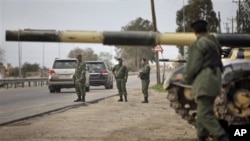The African Union Peace and Security Council has met to discuss events in Libya, but declined to follow other international bodies in imposing sanctions against the Gaddafi government. The Council also extended the mandate of an Ivory Coast mediation team.
The United Nations and the European Union have slapped sanctions on Libya. The Arab League has suspended Libya’s membership. But when Africa’s highest secruity body discussed the Libya question Monday, it took no action.
Libya is a major funder of the African Union, and has a seat on the 15-member Peace and Security Council, but its ambassador Ali Abdalla Awidan did not take part in the debate. He stood outside the Council chamber, where he declined to comment.
However, in a written statement sent to reporters Saturday, the ambassador condemned the use of excessive force and affirmed the right of the Libyan people to protest peacefully to express their demands.
AU Peace and Security Commissioner Ramtane Lamamra says the Council felt no need to act other than to express support for United Nations Security Council sanctions, which have the force of law under Chapter 7 of the U.N. charter.
"They have exchanged views and thoroughly discussed the evolution of the situation, including new developments represented by the decision made by the UNSC under Chapter 7, and they have decided to continue their consultations," Lamamra said.
U.S. Secretary of State Hillary Clinton, in a speech earlier in the day to the U.N. Human Rights Council, urged the African Union to follow the Arab League’s lead in suspending Libya’s membership. Lamamra said he had not heard about Secretary Clinton’s remarks.
"I’m not aware of that speech. I certainly will take, I will read it with big interest, but for now I have not seen that text and in which context this request has been put," Lamamra said.
Libya’s ambassador later joined the Council meeting as it voted to extend by one month the mandate of a high-level panel tasked with finding a solution to Ivory Coast’s post-election power struggle.
The panel was supposed to have completed its mission by the end of February. But the job is proving more difficult than expected, as incumbent Laurent Gbagbo refuses to hand over power to Alassane Ouattara, the internationally recognized winner of the November presidential election.
The panel, which includes the presidents of Mauritania, South Africa, Tanzania, Burkina Faso and Chad, is to meet Friday in the Mauritanian capital, Nouakchott.
Commissioner Lamamra said the Peace and Security Council is issuing a fresh appeal for calm during the extended mediation period.
"The council condemns all action from wherever they come from against the civilian population and expresses its serious concern with the deterioration of the security and humanitarian situation in Cote d’Ivoire," Lamamra said.
The United Nations says post-election violence in Ivory Coast has claimed more than 300 lives.
African Union Declines Action Against Libya




